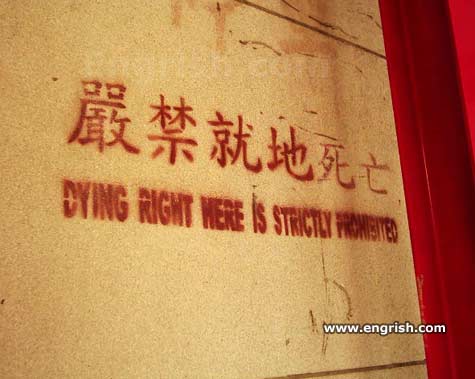
Leading up to the 2008 Beijing Summer Olympics, organizers promised to crack down on awkward, Chinese-inflected English, known as "Chinglish," and asked the public to help police bad grammar and faulty sign translation. With 500,000 foreigners expected for the Olympics, taxi drivers who can't speak English -- or signs that mangle the language -- it could be an embarrassment and distract from the $40 billion being poured into rebuilding the city for the games.
Throughout Beijing, examples abounded:
A store selling tobacco products advertises: “An Excellent Winding Smoke.”
On the floor at Beijing's Capital Airport, a sign reads: “Careful Landslip Attention Security.”
On a billboard, this mysterious message: “Shangri-La is in you mind, but your Buffalo is not.”
In an elevator, parents are warned: “Please lead your child to tare the life.”
Despite the problems, a government official said one-third of Beijing's 15 million residents speak some English, a claim that was challenged by a local reporter from China's state-run CCTV. “I think 5 million is a big number,” the reporter told the official. The official stood by the figure, but conceded the vast majority of the English speakers fell into a category he labeled “low level.” “They can have very simply conversations, like: ‘Who am I? Where am I going?’”
Efforts continue today to improve signage in English around Beijing's tourist attractions.





